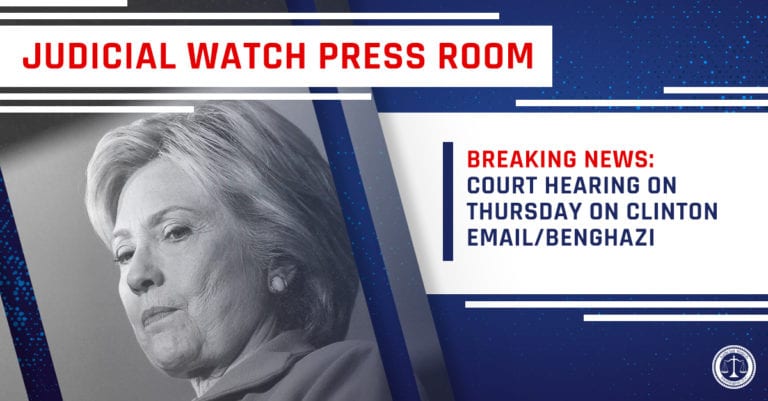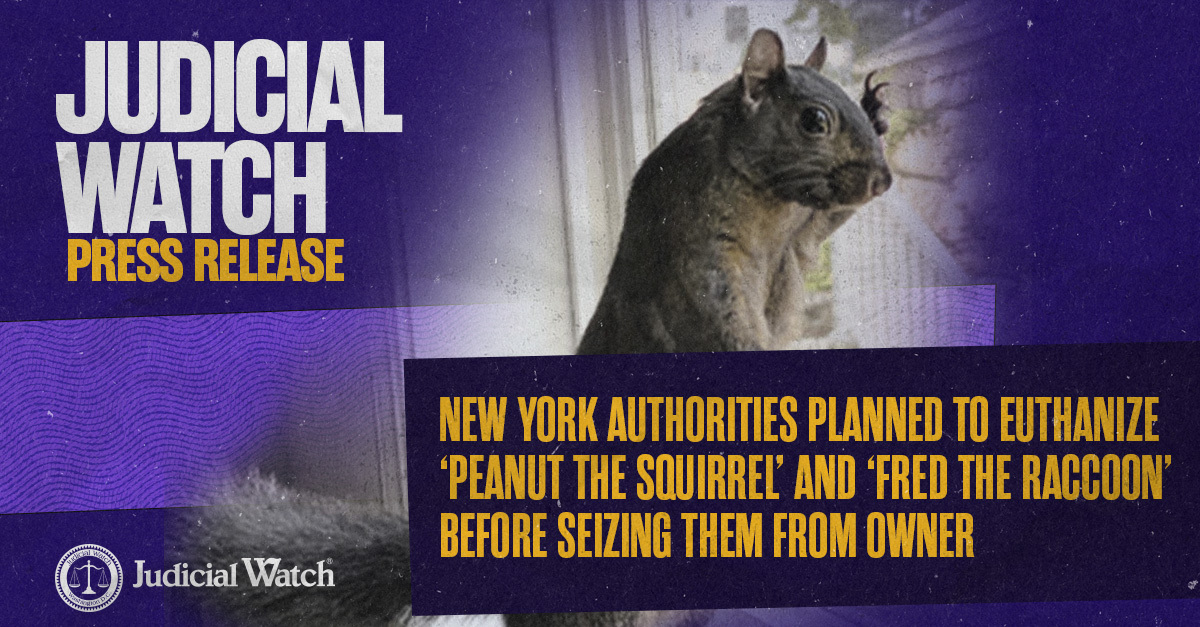
Judicial Watch: Court Hearing on Thursday on Clinton Email/Benghazi

Judicial Watch Seeks Clinton Testimony and Key Document on Clinton Email Destruction
(Washington, DC) – Judicial Watch today announced that a hearing was ordered to be held in federal court before U.S. District Judge Royce C. Lamberth on Thursday, December 19, regarding continuing discovery in the Clinton email scandal.
The court is considering whether to allow Judicial Watch to question Hillary Clinton and her top aide in person and under oath about the email and Benghazi controversies. Judicial Watch attorneys will also request the deposition of Paul Combetta, who was the IT specialist working on the Clinton server at Platte River Networks. Judge Lamberth specifically raised concerns regarding Combetta’s transfer of Clinton’s emails into a Gmail account, carterheavyindustries@gmail.com. The judge told Judicial Watch to “shake this tree” on the issue. Judicial Watch will ask the court for permission to subpoena Google for information from that account. Hillary Clinton is also fighting the court’s previously ordered release of an “after action memo” created by Clinton lawyer Heather Samuelson in December 2014 that memorializes the Clinton team’s review and processing of Clinton’s emails.
Judicial Watch’s lawsuit seeks records concerning “talking points or updates on the Benghazi attack” (Judicial Watch v. U.S. Department of State (No. 1:14-cv-01242)). Judicial Watch famously uncovered in 2014 that the “talking points” that provided the basis for Susan Rice’s false statements were created by the Obama White House. This Freedom of Information Act (FOIA) lawsuit led directly to the disclosure of the Clinton email system in 2015.
In December 2018, Judicial Watch announced court-ordered discovery into whether Secretary Clinton’s use of a private email server was intended to stymie FOIA; whether the State Department’s intent to settle this case in late 2014 and early 2015 amounted to bad faith; and whether the State Department has adequately searched for records responsive to Judicial Watch’s request. The court also authorized discovery into whether the Benghazi controversy motivated the cover-up of Clinton’s email. The court ruled that the Clinton email system was “one of the gravest modern offenses to government transparency.” The State and Justice Departments continue to defend Mrs. Clinton’s and the agencies’ email conduct.
“Judicial Watch uncovered new evidence of Clinton email misconduct and cover-up,” said Judicial Watch President Tom Fitton. “The Clinton email scandal – and the related Benghazi scandal are not going away. It is well past time for Mrs. Clinton to explain her email scheme to the court.”
The hearing is before U.S. District Court Judge Royce C. Lamberth.
Date: Thursday, December 19, 2019
Time: 10:00 a.m. ET
Location: Courtroom 15
U.S. District Court for the District of Columbia
333 Constitution Ave NW
Washington, DC 20001
As recently as October 2019, Judicial Watch forced the release of new Clinton emails on the Benghazi controversy that had been covered up for years and would have exposed Hillary Clinton’s email account in 2014 if the emails had been released when the State Department first uncovered them. The Clinton email was first identified by the State Department in September 2014, but was withheld from Judicial Watch despite its specific reference to Benghazi talking points. After it was described in an Office of the Inspector General report, the court ordered its production. It was only after Judicial Watch informed the State Department it was prepared to file a motion with the court to compel production of the records that the Department relented and produced the email in question.
In September 2019, the State Department provided Judicial Watch a previously hidden email, which shows top State Department officials used and were aware of Hillary Clinton’s email account, and that “she guards it pretty closely.” Despite a court order requiring production of the email, the DOJ and State Departments only produced it after Judicial Watch threatened to seek a court order to compel its production.
In an August 2019, hearing, Judge Lamberth ordered production of the record in granting Judicial Watch significant new discovery in the case. Judge Lamberth said, “There is no FOIA exemption for political expedience, nor is there one for bureaucratic incompetence.” The judge also stated that the government has mishandled this case and the discovery of information including former Secretary Clinton’s emails so poorly that Judicial Watch may have the ability to prove they acted in “bad faith.”
Judicial Watch’s discovery over the last several months found many more details about the scope of the Clinton email scandal and cover-up:
- Justin Cooper, former aide to President Bill Clinton and Clinton Foundation employee who registered the domain name of the unsecure clintonemail.com server that Clinton used while serving as Secretary of State, testified he worked with Huma Abedin, Clinton’s deputy chief of staff, to create the non-government email system.
- In the interrogatory responses of E.W. (Bill) Priestap, assistant director of the FBI Counterintelligence Division, he stated that the agency found Clinton email records in the Obama White House, specifically, the Executive Office of the President.
- Jacob “Jake” Sullivan, Clinton’s senior advisor and deputy chief of staff when she was secretary of state, testified that both he and Clinton used her unsecure non-government email system to conduct official State Department business.
- Eric Boswell, former assistant secretary of state for diplomatic security during Clinton’s tenure as secretary of state, testified that Clinton was warned twice against using unsecure BlackBerry’s and personal emails to transmit classified material.
- Lauren Jiloty, former special assistant to then-Secretary of State Hillary Clinton admitted in written responses under oath to loading contacts on Clinton’s unsecure BlackBerry. Jiloty also said that she conducted official State Department business from her own personal email account.
- Obama National Security Advisor and U.S. Ambassador to the United Nations, Susan Rice, admitted in written responses given under oath that she emailed with former Clinton on Clinton’s non-government email account and that she received emails related to government business on her own personal email account.
- Judicial Watch received written responses under oath from Clinton’s assistant Monica Hanley, asking whether the State Department adequately searched for records responsive to Judicial Watch’s request.
- John Hackett, former Director of Information Programs and Services (IPS) testified under oath that he had raised concerns that former Secretary of State Hillary Clinton’s staff may have “culled out 30,000” of the secretary’s “personal” emails without following strict National Archives standards. He also revealed that he believed there was interference with the formal FOIA review process related to the classification of Clinton’s Benghazi-related emails.
- Judicial Watch deposed State Department official Monica Tillery, asking whether the State Department’s intent to settle this case in late 2014 and early 2015 amounted to bad faith.
- Judicial Watch deposed Clarence Finney, the deputy director of the Executive Secretariat staff who was the principal advisor and records management expert in the Office of the Secretary responsible for control of all correspondence and records for Clinton and other State Department officials.
- Jonathon Wasser, the State Department employee who conducted Freedom of Information Act (FOIA) searches during part of Hillary Clinton’s tenure as Secretary of State testified that he did not clearly recollect whether he had any knowledge of potential email addresses for Secretary Clinton.
- Ben Rhodes, former Obama White House deputy strategic communications adviser, continued to blame an online video for the Benghazi attacks, claims he doesn’t remember using personal email for official business and that he wasn’t aware of Hillary Clinton using her non-government email for official State Department business before press reports made the fact public.
- Judicial Watch deposed State Department lawyer Gene Smilansky regarding whether the State Department’s intent to settle the case in 2014 and 2015 amounted to bad faith.
- Heather Samuelson, Clinton’s White House liaison at the State Department, and later Clinton’s personal lawyer, admitted under oath that she was granted immunity by the Department of Justice in June 2016.
- Former State Department Director of the Office of Information Programs and Services Sheryl Walter stated that she did not recall a call from the Obama White House asking for “quick turnaround” of information concerning a FOIA request on former Secretary Clinton’s use of personal email to conduct official business.
- Judicial Watch deposed Elissa Pitterle, the corporate representative assigned by the State Department to address questions concerning the processing of FOIA requests.
- Judicial Watch deposed Tasha Marie Thian, former records officer of the Records and Archives Management Division in the State Department, who testified: “I had been told repeatedly that [Clinton] did not use email for work” and therefore the records-management office “operated as if she did not use [email].” She said that Finney informed her Clinton used her personal email about Benghazi when she told him she was leaving in April 2014.
- Judicial Watch deposed Patrick Scholl, a FOIA public liaison at the State Department.
- Judicial Watch deposed Jamie Bair, an attorney in the Office of the Legal Adviser who was assigned to Judicial Watch’s Freedom of Information request and lawsuit. Bair testified that he first learned about Clinton’s email address shortly after joining the State Department in April 2014 and that he saw it while reviewing documents for Congressional requests regarding Benghazi. Bair said he informed his supervisor, Matt Burton. Bair testified that he told DOJ attorney Rob Prince about Clinton’s email address but would not provide a timeframe. He also testified that his normal practice was to be in close touch with DOJ attorneys on any given case.
###
















